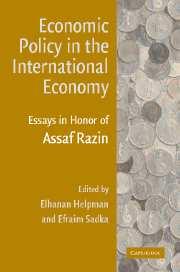Book contents
Introduction
Published online by Cambridge University Press: 03 November 2009
Summary
This volume brings together fifteen essays from various fields of economics to which Assaf Razin has made major contributions in the last thirty years – international economics, economic growth, public economics, and political economy. They all share a common feature: close relevance to economic policy, something which is at the essence of all of Assaf's contributions.
In “Crises: The Next Generation?” Paul Krugman reviews the evolution of the literature on currency and financial crises and suggests a direction to which this literature will turn in the future. The first-generation models were tailored to address a simple scenario. A government maintains a fixed exchange rate while running a budget deficit. The budget deficit is monetized, leading to a loss of foreign exchange reserves. As the level of reserves reaches a lower bound there is a run on the central bank that wipes out the remaining reserves. Unable to support the exchange rate, the government floats the currency. Under these circumstances the timing of the crisis is predictable, as are its consequences. It is an inevitable outcome of a set of inconsistent policies.
This description suited various episodes during the operation of the Bretton Woods system. With the advent of floating exchange rates, however, the nature of crises changed. This is particularly true of the 1992 episodes in Europe, which triggered the development of second-generation models.
- Type
- Chapter
- Information
- Economic Policy in the International EconomyEssays in Honor of Assaf Razin, pp. 1 - 12Publisher: Cambridge University PressPrint publication year: 2003

